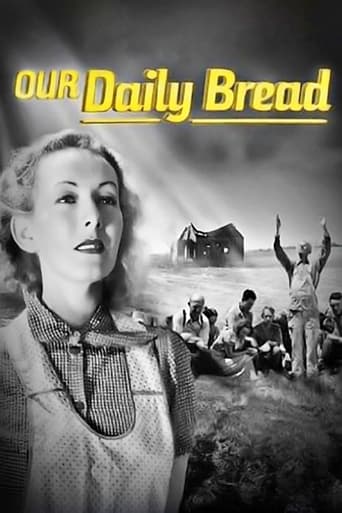Richie-67-485852
There is always a solution to every problem perhaps more than one and this problem and its solution moves and entertains. Who hasn't been desperate or down and out and worried about giving up and your luck changes for the better? Here we see that it is possible and to not give up hope. To me Hope is the central theme in this movie. The people work against all odds which is why hope not only works and sustains but delivers if we persevere. These people do just that. We can never really starve because we all have access to...
tieman64
An early classic by King Vidor, "Our Daily Bread" sees an unemployed couple defaulting on their rent and starting a co-operative out in the countryside. A reaction to the Great Depression, and the vast shanty towns which proliferated under President Herbert Hoover's administration, the film's a stark contrast to some of Vidor's latter works (he'd film Ayn Rand's "The Fountainhead" some years later).Much of the film watches as despondent men and women band together, form co-operatives and attempt to turn despair into hope. Revitalised by common purpose, our heroes start farming and housing projects, irrigation projects, and slowly create some semblance of order. Aesthetically the film is evocative of Soviet agitprop cinema, and perhaps Vidor's Kansas scenes in "The Wizard of Oz" (1939). It also contains a subplot about a seductive woman who infiltrates the cooperative and entices a community leader away from his wife and job; she's this Garden of Eden's own serpentine temptress. As the US government and CIA began a violent clampdown on all radically left-wing artists, movements and political bodies in America in the 1930s, and murderously did the same across most of the world over the next 90 years, films like "Our Daily Bread" became, not only rare, but a form of career suicide, especially in the wake of House Un-American Activities Committee. Vidor would film "The Fountainhead" some years later, its politics of extreme individualism reversing Vidor's themes in both "Bread" and his famous silent picture, "The Crowd". Indeed, many directors accused of left-wing sympathies, or who joined the American Communist party (Edward Dmytryk et al), would make proudly right-wing films after freeing themselves of the blacklist. Not wishing to be forced into either exile or bankruptcy, these were naked attempts by artists to ingratiate themselves with those in power. Vidor would himself join the anti-communist Motion Picture Alliance for the Preservation of American Ideals in 1944.7.9/10 – See "Salt of the Earth" (1954), "Grapes of Wrath" and Vidor's "The Big Parade".
Michael_Elliott
Our Daily Bread (1934)*** (out of 4) King Vidor turned his back on Hollywood and made this independent film in a time where it wasn't a smart idea to walk away from the major studios. In the film, Karen Morley and Tom Keene play a husband and wife suffering from unemployment but their rich uncle gives them some farm land to try and get it off the ground. Unable to do it themselves, they open their land up to other poor farmers so that they can all help one another and try to make a life off the land. I was pleasantly surprised to see how well made this film was. Even though it features a very low budget it does have some terrific direction and some of the best cinematography from this era. The only thing that hampers the film is the incredibly bad performance by Keene who would go onto act in the infamous Edward D. Wood, Jr. film Plan 9 From Outer Space. Keene is so over the top and out of place that you can't help wonder why Vidor didn't step in and do something. Outside of that the film is pretty powerful from start to finish even though this era was full of films dealing with unemployment. Morley is very good in her role and supporting players John Qualen, Barbara Pepper and Addison Richards are very good as well. The final moments of the film deal with the farmers trying to dig a two mile ditch so that water can reach their corn and this here is one of the most beautiful and powerful sequences I've seen in any film.
dbdumonteil
"Our daily bread" is some kind of follow-up to "The Crowd" (1928).Not only there is not work in the city anymore on account of the economy,but city is evil ,as temptress Sally shows.I love the way King Vidor tackled the subject : the society's rejects's plight after the Depression.He never loses his sense of humour ,even in the most dramatic scenes: John Sims trades his small guitar for a scrawny chicken,the farm is sold for 1.85 dollars ,etc"Our daily bread" is the new society in miniature Jim built with a little help from his pals .Every human being counts,a violin player is as useful as a carpenter.Politic is not much talked about;the word "socialism" is uttered once or twice ,but the keyword is " cooperative" ."Let's stand together" is their motto.It culminates in the last sequence,one of the strongest of all time !Songs,prayers,a bit of utopia but a lot of human warmth and love!Like this ?Try these ..."le Belle Equipe" Julien Duvivier 1936"Grapes of Wrath" John Ford 1940


